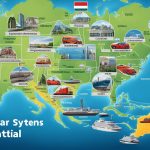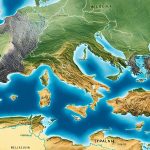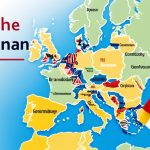Choosing where to settle in Europe can be tough, as Portugal and Germany offer varied experiences. Many from the UK think about moving to Portugal or Germany, attracted by beautiful views, unique cultures, and a lively expat lifestyle. Both Portugal’s relaxing atmosphere and beaches and Germany’s strong economy and cultural richness offer unique advantages for expats.
- Introduction to Relocating: Lifestyle Comparisons Between Portugal and Germany
- Cultural Distinctions: Portugal vs Germany
- Employment Opportunities: What to Expect in Portugal and Germany
- Cost of Living: Analysing Expenses in Portugal Against Germany
- Economic Stability and Growth: Portugal and Germany in Focus
- Quality of Life: Comparing Healthcare, Education and Infrastructure
- Portugal or Germany: Breaking Down the Tax Systems
- Climatic Conditions: Where to Find Your Ideal Weather
- Exploring Housing Markets: Renting and Buying in Portugal vs Germany
- Expat Communities: Finding a Sense of Belonging
- Leisure and Lifestyle: Recreational Activities in Portugal and Germany
- Work-Life Balance: How Portugal and Germany Compare
When considering a move, it’s vital to understand the living conditions in Portugal vs Germany. It’s more than just a change of scenery. It involves comparing work life in Portugal vs Germany and seeing which suits your goals and way of life best. This guide will help explain what life is like in these historic European landscapes for those dreaming of a new start.
Introduction to Relocating: Lifestyle Comparisons Between Portugal and Germany

Moving to another country is a big step that comes with many things to consider. For UK folks thinking about moving abroad, it’s crucial to understand the lifestyle differences in Europe, especially between Portugal and Germany. Both countries offer unique cultures, daily lives, and social vibes.
Portugal is known for its laid-back lifestyle and Mediterranean charm. This contrasts with Germany’s focus on structure and efficiency. This means life can change a lot depending on where you choose to move.
- Portugal is famous for its slow-paced life, welcoming communities, and sunny weather perfect for outdoor activities.
- In contrast, Germany boasts a strong economy, a rich history, and a well-organized society that values being on time and having things in order.
Let’s explore what to expect in terms of culture, social life, and the overall feeling that shapes life abroad:
- Enjoy Portugal’s beautiful beaches or Germany’s lively city parks and forests.
- Experience community spirit at Portuguese festivals compared to traditional German celebrations that showcase local pride.
- Get used to the Portuguese way of enjoying long, relaxed meals with friends versus Germany’s fast, punctual eating habits.
It’s important for UK expatriates to think about these differences when planning a move. The choice between a relaxed lifestyle and a more structured one will affect their work-life balance, social life, and overall happiness.
Whether you are seeking a quiet getaway in Portugal’s vineyards or an exciting start in Germany’s modern cities, the decision isn’t just about moving places. It’s about choosing a lifestyle. Both countries welcome Brits looking to settle in Europe, but this choice will shape your future experiences and opportunities.
Cultural Distinctions: Portugal vs Germany
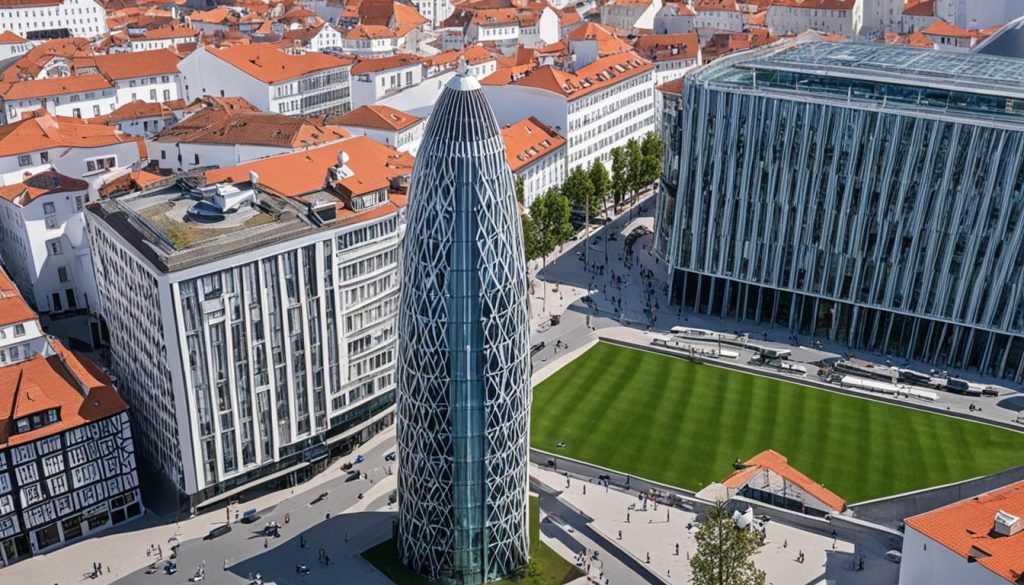
Exploring the cultural differences between Portugal and Germany reveals unique customs in each country. Though they share a continent, their cultural worlds are quite diverse due to their distinct histories. Let’s take a closer look at what sets their social fabrics apart.
Understanding the Portuguese Way of Life
In Portugal, traditions blend with a laid-back vibe. The Portuguese life centres around family and community, creating a welcoming and supportive atmosphere.
- Long meals with loved ones are key in Portuguese social life, often lasting hours.
- Festive events full of history and joy highlight the calendar, showcasing local traditions.
- Portuguese people enjoy relaxed lunch breaks and late dinners, showing a preference for personal time over strict schedules.
This culture of togetherness and happiness defines the Portuguese way, leaving a lasting impact on daily life.
German Traditions and Values
In contrast, Germany values precision, structure, and timeliness. These principles support German social and business practices.
- Being on time is crucial in Germany, where being late is often seen as disrespectful.
- Events in Germany are well-organized, reflecting the society’s appreciation for order.
- Efficiency and meticulousness are celebrated, reflecting Germans’ love for order and conformity.
This focus on structure and formality might feel rigid but helps maintain an efficient society.
Societal Norms and Public Etiquette
The societal norms and manners in Portugal and Germany mirror their cultural identities. How people greet each other and act in public tells us a lot about these societies.
- In Portugal, greetings are warm, often with hugs or cheek kisses, showing a society that values closeness.
- German greetings are friendly but reserved, with handshakes and a respect for personal space.
- Both nations value politeness and courtesy in public, although the way these qualities show can vary.
The cultural differences between Portugal and Germany are deep and varied. These distinctions shape their everyday life, social practices, and overall approach to living, creating rich cultural narratives.
Employment Opportunities: What to Expect in Portugal and Germany
When looking to move to Europe, it’s crucial to consider how the job market in Portugal compares with career prospects in Germany. Both countries provide unique opportunities and challenges for UK expats aiming for success abroad.
In Portugal, the tech scene is booming in cities like Lisbon and Porto. This boom attracts startups and tech firms, offering great chances for skilled workers. Germany, with its strong economy, leads in automotive, engineering, and manufacturing. It offers many jobs for those with technical skills.
- The rise of tech in Portugal is creating jobs for IT pros, digital marketers, and support staff.
- In Germany, there’s a steady demand for engineers, technicians, and product managers.
- Knowing the local language boosts your chances. Portuguese is useful in Portugal, while German is almost a must in Germany.
Thinking about what you’ll earn is also important. Germany often pays more due to its stronger economy. But living there can cost more than in Portugal. When moving to Europe, think about these financial aspects.
The work culture in each country could affect how happy and successful you are at work. Portugal enjoys a relaxed approach, valuing breaks and balance. Germany is known for its efficiency, strong work ethic, and punctuality.
For job seekers wanting to succeed, they should:
- Use social media, like LinkedIn, to grow a professional network.
- Look into companies and sectors that need their skills.
- Go to job fairs and talk to employment agencies focusing on international workers.
Getting to know the job markets in Europe can open up great career opportunities. With effort and an open mind, UK expats can find places that are welcoming and ripe with chances for success and happiness.
Cost of Living: Analysing Expenses in Portugal Against Germany
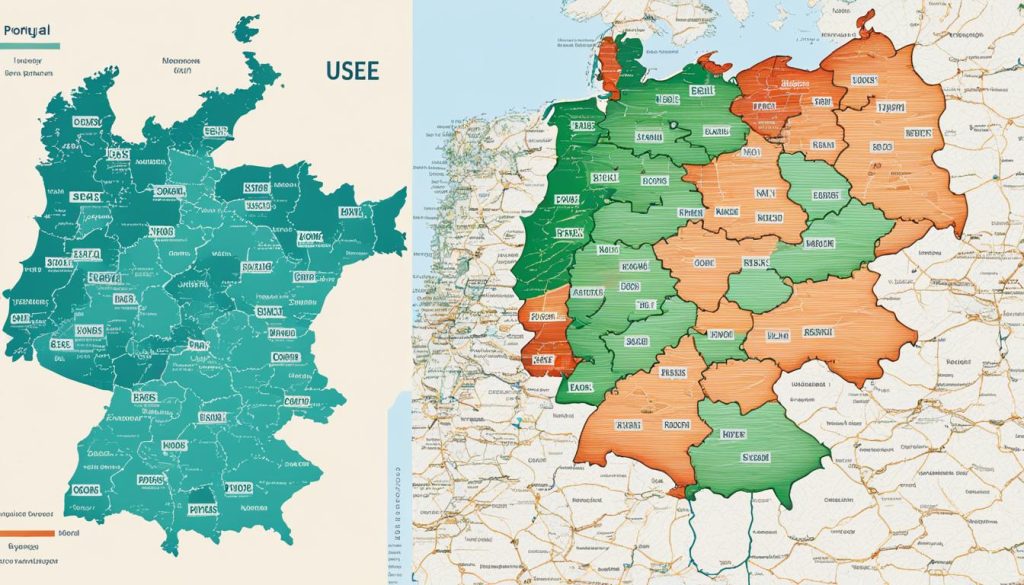
Comparing the cost of living between Portugal and Germany is crucial for UK expats. They must look at different expenses that shape their budget in Europe. These two countries offer great cultural experiences and quality of life but have different costs. This breakdown gives a clearer view of how affordable Portugal and Germany are.
- Housing: Expats often find Portugal’s rent cheaper than Germany’s, especially in big cities like Lisbon and Berlin. But, prices for homes can greatly vary by location and type.
- Utilities: Utility bills in Germany are higher than in Portugal. This is particularly true for heating in winter. Portugal’s mild weather usually means lower heating costs.
- Food: Food shopping is more wallet-friendly in Portugal, with lots of fresh produce at local markets. Germany’s food prices are a bit higher, but it offers a wide selection of international items.
- Transport: Both countries have good public transport, but Portugal’s is cheaper. This makes it a more budget-friendly choice for commuting and traveling.
- Healthcare: Healthcare is efficient in both nations, but it’s generally more affordable in Portugal. This helps lower the overall cost of living there.
This analysis aims to help UK expats decide where to relocate. Whether it’s for Portugal’s beautiful coasts or Germany’s strong economy, understanding each country’s costs is key. While life quality matters, how affordable Portugal or Germany is remains crucial for those planning to move.
Economic Stability and Growth: Portugal and Germany in Focus
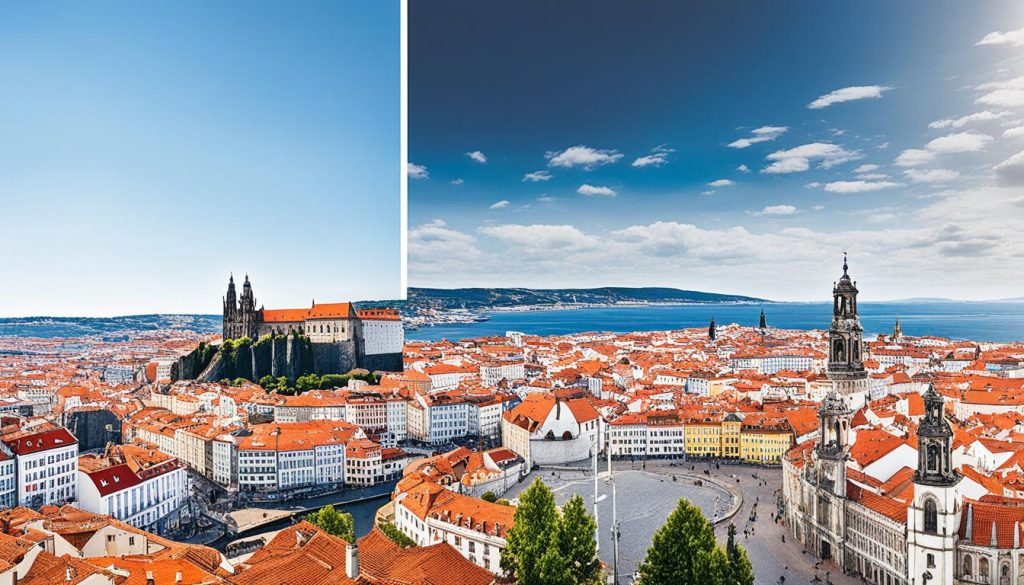
Expatriates looking to move need to understand Portugal and Germany’s economies. These countries offer more than just cultural appeal or a better life. Their economic stability and opportunities play a big part too.
Assessing the Job Market and Economy
Germany is known for its large, strong economy and skilled workforce. It’s home to major industries like automotive and electronics. On the other hand, Portugal, though smaller, is growing. Its tourism and technology sectors are creating new jobs. The Portugal Germany economic comparison shows how Germany’s strong economy contrasts with Portugal’s vibrant one.
Impact of Economic Policies on Daily Living
Economic policies in these countries affect people’s daily lives. Germany has a strong social safety net and supports businesses. This helps with innovation and provides security for its people. Portugal has been working on economic reforms. These have improved taxation and social welfare, benefiting residents and expatriates alike. For those from the UK, these policy differences could influence their choice between living in Portugal or Germany.
Expatriates have a lot to think about, whether it’s Germany’s job market or Portugal’s growth sectors. The story of Europe’s economy is changing, offering many opportunities for those ready to take advantage.
Quality of Life: Comparing Healthcare, Education and Infrastructure

When thinking about moving, the quality of life is key. Healthcare, education, and infrastructure are vital in this choice. Looking at Portugal and Germany, we consider global standards and expat views.
Healthcare in Portugal versus Germany focuses on service effectiveness and reach. Germany is known for its efficient system and wide healthcare coverage. It ranks high worldwide. Though smaller, Portugal is improving its healthcare, focusing on patients. Both countries provide universal healthcare, but Germany’s investment means more services and quicker treatments.
- Effectiveness and quality of the healthcare services.
- Availability of medical professionals and facilities.
- Healthcare costs and insurance schemes for expatriates.
In terms of education, Germany and Portugal have their strengths. Germany’s education system, which places a big focus on research, is robust and well-funded. Portugal, however, is known for its solid education with an increasing emphasis on global awareness and languages. Germany boasts large, famous institutions, while Portugal is renowned for its supportive learning environments.
- Comparison of public and private education institutions.
- Assessment of international schooling options for expat children.
- Availability of higher education courses in English.
Infrastructure is vital for a good life quality. Germany excels with its great public transport, highways, and advanced facilities. Portugal has also greatly improved, especially in cities like Lisbon and Porto, focusing on sustainability and public transport. Digital infrastructure, essential today, is strong in both countries.
- Quality and reach of public transport systems.
- Modernisation and sustainability initiatives.
- Digital infrastructure to support communication and business.
While Germany leads in healthcare, education, and infrastructure, Portugal presents a competitive life quality with lower living costs. This makes Portugal a favorable choice for many expats from the United Kingdom.
Portugal or Germany: Breaking Down the Tax Systems
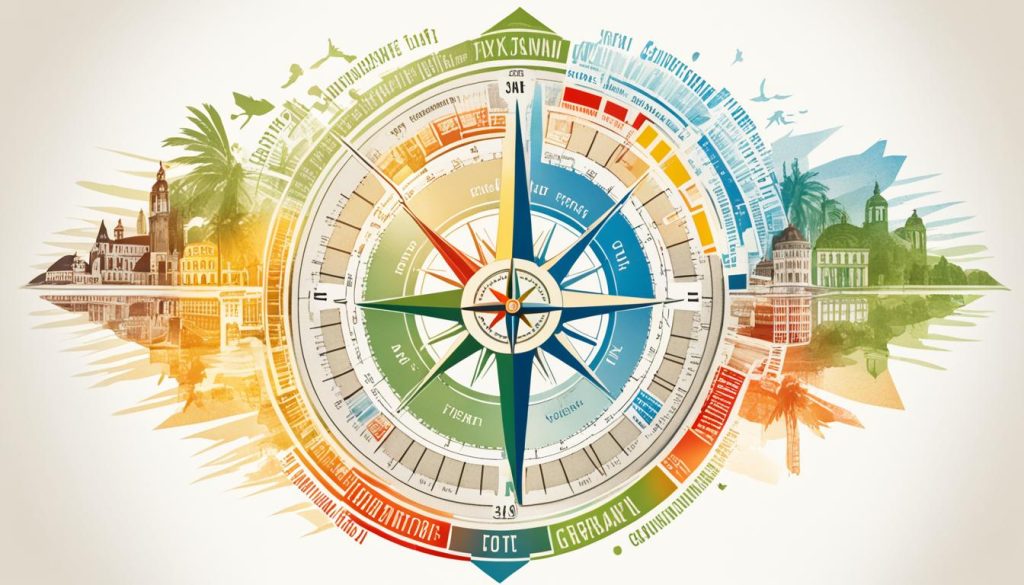
If you’re moving to Europe, knowing about tax systems matters. Looking at Portugal and Germany helps. It influences your money and future plans, especially for UK folks moving abroad.
Understanding Tax Rates and Implications for Expats
In Portugal, expats like the flat tax rate offered by the non-habitual resident regime. But in Germany, taxes go up as your income does. This makes tax planning essential.
Navigating Tax Benefits and Deductions
Exploring tax systems means checking out benefits and deductions. Portugal allows deductions like health and education. Germany offers benefits such as child allowance and expat deductions. Knowing about double taxation agreements stops you from being taxed twice.
- Tax rates in Portugal: Non-habitual residents benefit from reduced rates
- German tax rates: Their progressive tax system and associated complexities
- Expat taxation Europe: Understanding deductions, non-typical residents’ regimes, and double taxation agreements
Climatic Conditions: Where to Find Your Ideal Weather

UK expats often consider climate when choosing a new home in Europe. They notice a big difference between Portugal’s warm Mediterranean weather and Germany’s cooler, variable climate. Those looking for the best weather in Europe decide based on their preference for either warmth or cooler conditions. Let’s explore the weather patterns of these two culturally rich countries.
- Portugal is well-known for its lovely Mediterranean climate. It has long, sunny summers and mild winters. This weather is perfect for many activities, like relaxing on the beach or exploring old towns.
- Germany has a continental climate with cold winters and warm summers. This attracts people who like seasonal changes. It offers winter sports and summer activities like hiking or cycling.
Both countries have clear seasonal changes, but they differ greatly. Portugal’s seasons change gently, with a lot of sunshine throughout the year. On the other hand, Germany has a big shift from winter’s snow to summer’s warm beer gardens. These differences affect lifestyle choices. In Portugal, you can enjoy outdoor dining and water sports all year. But in Germany, people often visit museums and theaters in winter for fun indoors.
UK expats looking for either a gentle ocean breeze or the fresh air of the highlands need to understand these climate differences. Knowing about the Portugal vs Germany climate and the Mediterranean vs continental climate helps in choosing the right place to call home.
Exploring Housing Markets: Renting and Buying in Portugal vs Germany
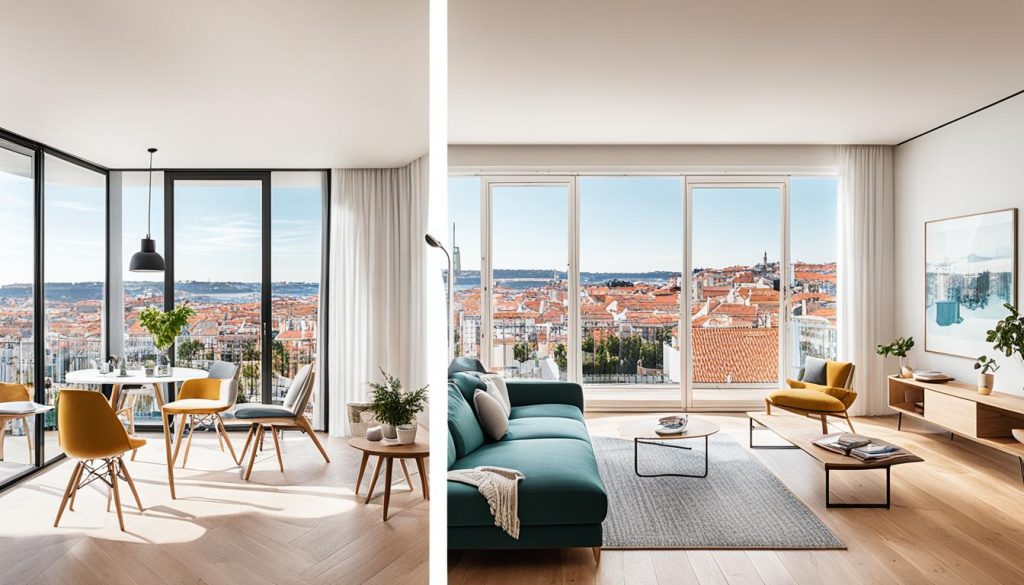
Thinking of moving to Europe? It’s vital to compare Portugal’s housing market with Germany’s. This gives you a clear start to find a new home. Let’s focus on these two places today.
In Portugal, you’ll enjoy the warm climate and reasonable property prices, especially outside big cities. Key points include:
- Renting offers a variety, from beach houses to city flats. It’s affordable.
- Buying a home is straightforward. Foreigners face no ownership restrictions, after legal checks.
- Homes in tourist areas or growing cities promise good value growth.
Now, looking at Germany, the situation changes:
- Germany has a solid economy, making its housing market strong but pricey, especially in cities like Munich or Frankfurt.
- Many choose to rent, enjoying a secure and regulated rental market.
- Buying a home includes more steps and upfront costs. Yet, the benefits are high-standard builds and energy-saving homes.
To really understand the housing in Europe, consider lifestyle and laws too. Always get legal advice before buying. This ensures your European home is safe and sound.
Expat Communities: Finding a Sense of Belonging
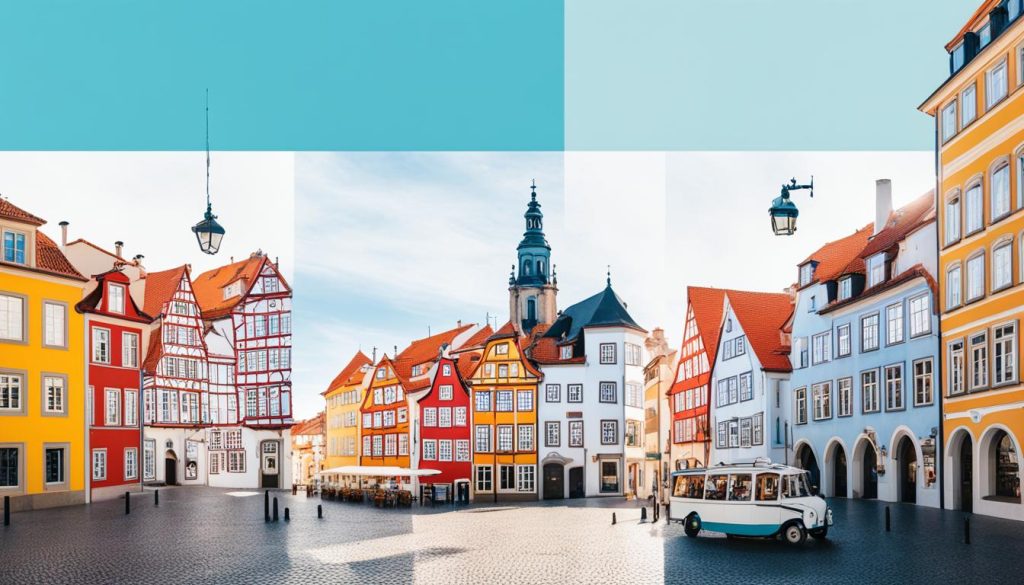
Moving to a new country is more than just a change of address. It’s about fitting into a new society. Many UK expats are drawn to sunny beaches or a well-organized German way of life. Whether it’s life in Portugal, settling in Germany, or joining communities across Europe, these steps are vital.
Connecting with Fellow Expatriates
Creating a social circle in a new place is key to feeling at home. Expat groups in countries like Portugal and Germany help newcomers find friends. Here are ways to start making connections:
- Join online expat forums and social media groups.
- Attend local meetups, language exchanges, and international events.
- Participate in community clubs or sports leagues popular among internationals.
Cultural Integration and Support Networks
Adapting to a new culture is both exciting and challenging. In Portugal, expats are welcomed warmly, making integration easy. The local lifestyle and English-speaking locals add to the ease. In Germany, there are structured courses and a stable setting for those planning to stay long-term. Support includes:
- Language classes for Portuguese or German mastery.
- Cultural orientation workshops.
- Access to both governmental and non-governmental support for foreigners.
Being open to new cultures brings a lot of support. This makes life in Portugal and settling in Germany rich experiences for UK migrants.
Leisure and Lifestyle: Recreational Activities in Portugal and Germany
People moving to Europe from the UK love the leisure options there. Portugal is known for its laid-back lifestyle and many activities. You can enjoy sunny beaches in the Algarve or explore Lisbon’s cobbled streets. Portugal’s mild weather is perfect for golf, surfing, and walking. It’s ideal for those who love being active outdoors.
In Germany, there’s a different kind of fun to be found. It has a rich culture, offering lots of things to do. Cities are full of festivals, museums, and theatre shows, showing its cultural importance. The Black Forest and Bavarian Alps are great for snow sports and hiking. Germany focuses on community and organization in its recreational activities, with many clubs for different hobbies.
- Portugal’s outdoor dining and rich gastronomic culture offer relaxed evenings savouring local cuisines and regional wines.
- German recreational options also include urban green spaces and well-maintained parks, where locals frequently enjoy picnics and leisurely strolls.
Both countries are rich in history, offering even more ways to have fun. In Portugal, you can explore old ruins. In Germany, you can visit medieval castles. These experiences allow you to dive into the country’s culture and past.
- Portugal’s festas (street festivals) and carnivals embody the festive spirit of the population, encouraging communal celebrations.
- Germans take pride in their traditional festivals, such as Oktoberfest, and Christmas markets, which provide family-friendly entertainment and showcase local crafts.
Joining in local leisure activities is a great way to fully experience European life. For those moving from the UK, the variety of things to do in Portugal and Germany makes living there very appealing.
Work-Life Balance: How Portugal and Germany Compare
Many UK expats look for a better work-life balance in Europe. Portugal and Germany offer different work cultures to fit personal needs. This discussion explores their work-life satisfaction models. As we compare, think about your ideal balance between work and fun.
Exploring Germany’s Efficiency Model
Germany values efficiency and structure at work. Germans focus on being punctual, organised, and productive. This strict work culture means less overtime. Thanks to this, Germans enjoy separate, respected personal lives. This model in Europe makes sure there’s time for fun away from work.
Portugal’s Laid-Back Approach to Work
Portugal presents a relaxed work-life balance. It favours long lunch breaks and a flexible start to the day. This shows the country’s easy-going nature and focus on life beyond work. In Portugal, personal time and relationships are key. This approach appeals to those tired of the UK’s fast work pace.
Choosing between German and Portuguese work cultures depends on personal preference. Both promise a better work-life balance in Europe. This attracts Britons seeking a new work and personal life balance abroad.



